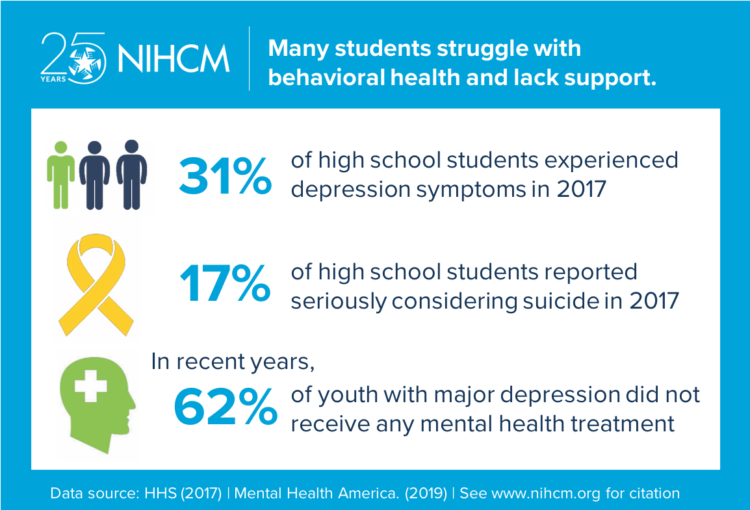NIHCM Newsletter / August 2019
Helping Schools Support Student Health

Health & Wellness Resources for Schools
Schools play an important role in screening for student health and providing critical support, but they often lack the capacity to best serve all students in need. Two federal agencies - the Substance Abuse and Mental Health Services Administration and the Centers for Medicare & Medicaid Services - partnered up to develop this guide for schools regarding options within and beyond Medicaid to get funding for mental health and substance use services for students. In addition, The Trevor Project has developed a Model School District Policy for Suicide Prevention to help schools prevent, assess, intervene in and respond to suicidal behavior.
Millenials: Not As Healthy as You Think
Though 83% of millennials consider themselves to be in good or excellent health, millennials overall are not as healthy as the previous generation, according to the Blue Cross Blue Shield Health Index. Older millennials (age 34-36) have higher rates for the top 10 health conditions than Generation Xers did at their age, and 6 of the top 10 conditions are behavioral health conditions. Due to the higher than average rates of depression among millennials in their member states, Wellmark convened a forum to identify barriers to solving this issue. Participants highlighted stigma, lack of an identified primary care doctor and pressure to exceed expectations as challenges for millennials in managing their behavioral health.

The Opioid Crisis: Partnerships & Progress
This month, the Centers for Disease Control and Prevention announced that the number of Americans killed by a drug overdose dropped for the first time in two decades.
Though this is a small sign of progress, substance use remains a persistent problem throughout the U.S. Public and private sector leaders continue to implement programs designed to help people recover from substance use disorder and its effects. Renew Recovery is a Kentucky-based program now covered by Anthem that allows people to receive treatment in their own home, so they can continue to go to work and spend time with their loved ones while undergoing treatment. In North Carolina, Blue Cross NC is supporting a story-telling campaign that will raise awareness of and share information about the opioid crisis.
Community Investments in Social Determinants
In a month in which Congress introduced its first bill focused on social determinants of health, a number of health care leaders are making investments to raise awareness, advance progress and develop solutions to address the social factors that impact our health.
- The Block by Block Food Insecurity Challenge asks entrepreneurs, nonprofits and innovators to pitch their best ideas to ending food insecurity in Florida.
- Through rain-activated messages on sidewalks, Blue Cross and Blue Shield of Minnesota is sharing messages about social inequity. Their Foundation is backing up their words with grants to 23 nonprofits working to build more connected, resilient and inclusive communities.
- In Texas, Blue Cross is providing grants to target challenges like coordinating behavioral and physical health and expanding services for people with special needs.
- Feeding America has partnered with Anthem to connect food banks and hospital systems as part of a program to conduct universal food insecurity screenings and interventions.
More Related Articles
See More on: Behavioral Health
